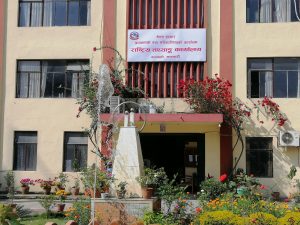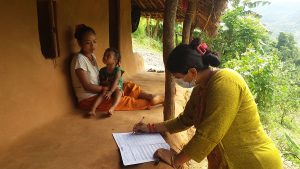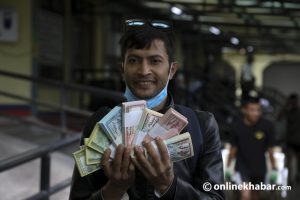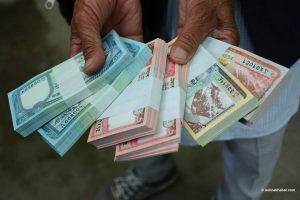With the second wave of the Covid-19, district administration officers of the Kathmandu valley implemented the prohibitory order in the valley from April 29. It has been extended up to June 3 with the May 25 decision. Even during the prohibitory order, department stores, groceries and other stores providing necessary services were functioning up to 10 am in the morning. But now, the CDOs have prohibited the functioning of groceries and department stores up to June 3.
Whereas the stores are functioning till 10 am in the morning, we can see numbers of people outside the grocery stores to buy essentials within the time limit. The availability of a shorter time frame for shopping the grocery has raised the risk of Covid-19 as customers in a high number gather outside the grocery stores in that particular period. Therefore, the government should have thought about functioning groceries and departmental stores for a longer time, but it has decided to completely close these stores for one week. Interestingly, it has ensured the availability of luxury items like meat and fruits till 9 am on a daily basis.
During the time of emergency when people cannot afford basic food items, do they have the capacity to store the foods for a week? Are meats and fruits more important than basic food items (groceries)? Can the government derogate the right to food?
The wrong about the right

At the time of emergency, the government can suspend certain human rights in accordance with relevant provisions and conditions under the applicable international human rights treaties. But there are certain human rights which cannot be derogated even at a time of emergency. The right to food is a human right that has been guaranteed by different national and international instruments. Nepal is a party to the International Covenant on Economic, Social and Cultural Rights (ICESCR) which has ensured the right to food under Article 11. The constitution of Nepal also ensures the right to food as a fundamental right in article 36. It is a non-derogable right. But, the government has decided to derogate this right by closing the groceries and department store for one week.
Derogation of the right to food not only breaches international norms and values of human rights but also endangers the food and nutrition security of people. In Nepal, 18.7 per cent of the population lives under the poverty line. According to the data of October 2020, Nepal is in the 73rd position among 107 countries where it scores 19.5 on Global Hunger Index. The majority of the population spend their earnings of a particular day to buy groceries as they cannot afford to store goods for a week or a month.
Some groups of people even eat once a day or have no food to eat as their earnings have been hampered due to various circumstances created by Covid-19. During the lockdown last year, thousands of workers walked hundreds of kilometres to their home as they had no source of income to survive in cities. Walking back home was the only option to fulfil their hunger. Some people like Malar Sada died due to hunger and his family had nothing to eat. They survived eating niguro (fiddlehead fern) gathered from nearby Koshi Tapu Wildlife Reserve. The availability of food stores cannot fulfil the hunger of many people as they have no income to buy food.
Bigger risks

In a country where a big number of people has no access to basic food items, the government has decided to close stores selling basic food items and to operate shops selling meat and fruits. There are several groups of people who depend on their daily wages to purchases basic food items. If the groceries and department stores are completely closed during the emergency, the population of this group will be compelled to live in hunger as they cannot afford to buy and store necessary goods for a week at once.
Prolonged exposure to hunger and malnutrition can trigger infections and various other mental and physical dysfunctions. Nepalis who are already struggling with hunger has to now further risk their life with the non-availability of food. In this situation where the government should have provided relief to people who are starving due to hunger, it has decided to further curtail their right to availability of food.
On the one hand, a massive gathering of people for political issues has been entertained by the government. Rather than focusing on Covid-19, politicians are busy in meetings to discuss issues such as the vote of confidence, the dissolution of parliament and then filing cases against each other. But, on the other hand, the functioning of groceries and departmental stores, providing relief to people, and making vaccines available to all the citizens have been non-priorities. Ensuring the availability of food is of less priority to the government even if the right to food is a non-derogable right.
This order is issued with no consideration of the non-derogable feature of the right to food and the population living in poverty. More precisely, the right to food security has been disregarded and the decision has been made considering the so-called well-off or rich people of the society. By respecting human rights including the right to food security, rather than closing these stores, the government of Nepal should allow the functioning of groceries and department stores with certain limitations as per the situation of the country to protect people from hunger.
























